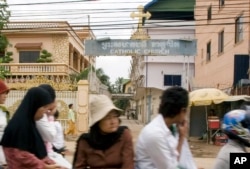The Khmer Rouge Tribunal judgment in Case 002/02 provides an opportunity to consider the advancement of justice, but we must recognize the significant shortfalls and limits of this tribunal, which have left many victims without a voice.
Genocide is not easy to prosecute. A conviction for the crime of genocide requires clear proof of “mental intent” to kill or displace a people based on national, ethnic, racial, or religious identity. The Khmer Rouge Tribunal – formally known as Extraordinary Chambers in the Court of Cambodia (ECCC) –has jurisdiction to prosecute the genocide of people based on religion as well as many other crimes.
The ECCC has jurisdiction to try suspects for religious persecution as set forth under the 1956 Penal Code, as well as crimes against humanity for acts committed as a widespread or systematic attack directed against a population for religious grounds.
The tribunal also has the power to bring suspects to trial for the destruction of cultural property pursuant to the 1954 Hague Convention for Protection of Cultural Property in the Event of Armed Conflict. While circumstances surrounding these crimes were discussed in the ECCC’s judgment as it relates to Buddhists and Muslims, there was no mention of crimes or actions taken against Christians or the Christian faith.
Between April 1975 and January 1979, the Khmer Rouge destroyed significant numbers of Christian churches and many Christians were killed. Phnom Penh’s first Cathedral, the Preah Meada was decimated, and the Notre Dame Cathedral in Phnom Penh, which could hold up to 10,000 people, was blown up. Accounts from this period describe churches being utterly destroyed, and many Cambodian Catholic priests were killed, including Joseph Chmar Salas, the first Khmer Catholic bishop to Cambodia.
Courts are limited in what they can do for victims. Criminal courts ordinarily do not compensate victims, and any reparations they provide are often largely symbolic. One of the most important contributions that courts can provide is the establishment of a record.
The court record provides victims an opportunity to speak to the accused, the public, and the next generation on what they experienced. Even for those victims who could not speak, the record is important, if only for purposes of recognizing collective harm. Recognition of collective harm in courts gives respect to the individual victims and their surviving family members, and it provides historians with one more reference for their work in describing what happened and why.
But there is always a balance between maximizing the scope of the record of what happened and why, with the limits of court resources. The question is to what extent should we allow the conservation of court resources (or whatever other reason is offered) to effect an under - or misrepresentation of the actual experience of a group of victims.
There seems little doubt that Christians were persecuted. There also is no doubt that Christianity, as it was expressed in architecture, ceremonies, and other relics of the past, largely disappeared during the Khmer Rouge period.
The critical question is whether Christians were targeted on religious grounds on the same basis as Buddhists or Muslims. The Trial Chamber found that certain groups were targeted based on religious differences. The chamber found that the Cham suffered under restrictions to their religious practices, and they were persecuted on religious grounds. The chamber also found that Buddhists were also subject to religious persecution. While the chamber found that the Vietnamese were targeted based on race and ethnicity, they chose not to inquire, discuss, or answer any question related to the treatment of their Christian faith.
The history of Christianity in Cambodia dates back hundreds of years. The first missionaries arrived in Cambodia in the 16th century and they contributed or supported charity, good works, culture, and learning. One may say that the lack of attention to the treatment of Christians may be based on the relative small number of Christians that existed in Cambodia at that time. One estimate suggests that, at least in 1970, there were more than 60,000 Catholics in Cambodia.
On December 29, 2018, Cambodia will mark the historical “ending” of the Khmer Rouge movement. On this day, twenty years ago, Khieu Samphan and Nuon Chea defected from the Khmer Rouge. On that day, Khieu Samphan urged Cambodians to “let bygones be bygones” regarding the deaths of over a million people, and Nuon Chea said, “Please leave this [the deaths] to history. This is an old story. Please leave it to the past.”
The past is never dead. In fact it continues to resonate in all that we know, think, and do. All of us bear a duty to not forget the past. We cannot expect courts to bear the entire responsibility of recording the past. We must take up where the tribunal has left us and make every effort to ensure history, as witnessed through each victim, is preserved for the next generation.Where the court’s record is limited, incomplete, or insufficient, we must take the initiative to preserve this history so the voices of all victims can be heard for all time.
Youk Chhang is the director of the Documentation Center of Cambodia, an independent nongovernmental organization that holds the world's largest collection of documents from Democratic Kampuchea. He provided more than half of million evidentiary pieces to the Khmer Rouge Tribunal.









